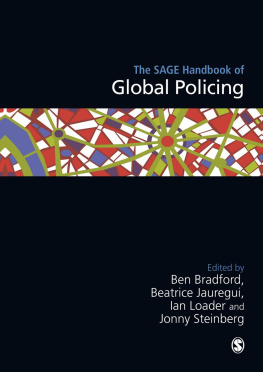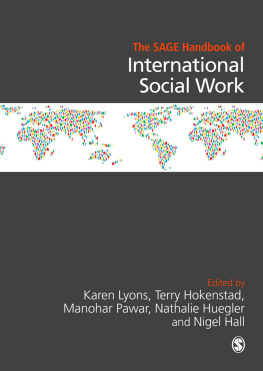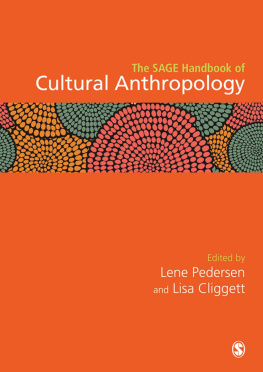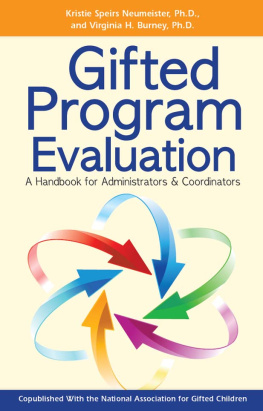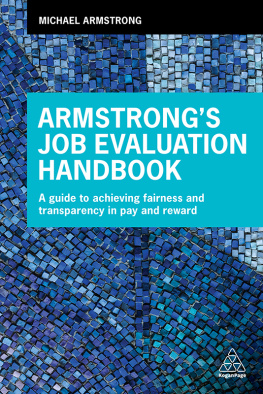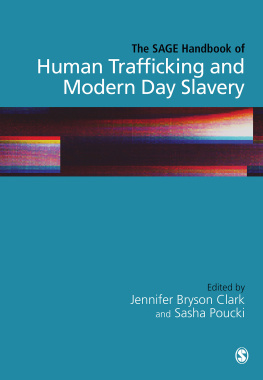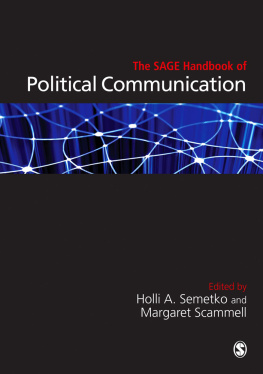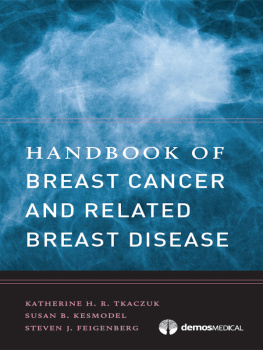The SAGE
International
Handbook of
Educational
Evaluation
The SAGE
International
Handbook of
Educational
Evaluation
Editors
Katherine E. Ryan
University of Illinois at Urbana-Champaign
J. Bradley Cousins
University of Ottawa
Copyright 2009 by SAGE Publications, Inc.
All rights reserved. No part of this book may be reproduced or utilized in any form or by any means, electronic or mechanical, including photocopying, recording, or by any information storage and retrieval system, without permission in writing from the publisher.
For information:
 | SAGE Publications, Inc. | SAGE Publications India Pvt. Ltd. |
| 2455 Teller Road | B 1/I 1 Mohan Cooperative |
| Thousand Oaks, California 91320 | Industrial Area |
| E-mail: | Mathura Road, New Delhi 110 044 |
| India |
| SAGE Publications Ltd. | SAGE Publications Asia-Pacific Pte Ltd |
| 1 Olivers Yard | 33 Pekin Street #02-01 |
| 55 City Road | Far East Square |
| London EC1Y 1SP | Singapore 048763 |
| United Kingdom |
Printed in the United States of America
Library of Congress Cataloging-in-Publication Data
Ryan, Katherine.
The SAGE international handbook of educational evaluation/Katherine Ryan, J. Bradley Cousins.
p. cm.
Includes bibliographical references and index.
ISBN 978-1-4129-4068-9 (cloth : alk. paper)
1. Educational evaluationHandbooks, manuals, etc. I. Cousins, J. Bradley. II. Title.
LB2822.75.R9 2009
379.158dc22 2009003451
This book is printed on acid-free paper.
09 10 11 12 13 10 9 8 7 6 5 4 3 2 1
| Acquisitions Editor: | Vicki Knight |
| Associate Editor: | Sean Connelly |
| Editorial Assistant: | Lauren Habib |
| Production Editor: | Catherine M. Chilton |
| Copy Editor: | Heather Jefferson |
| Typesetter: | C&M Digitals (P) Ltd. |
| Proofreader: | Annette R. Van Deusen |
| Indexer: | Diggs Publication Services |
| Cover Designer: | Glenn Vogel |
| Marketing Manager: | Stephanie Adams |
Contents
Fazal Rizvi
Thomas A. Schwandt
Nick L. Smith
Melvin M. Mark
Peter M. Steiner, Angela Wroblewski, and Thomas D. Cook
Madhabi Chatterji
Gary T. Henry and Dana K. Rickman
Jacob Marszalek and Debra D. Bragg
Lois-ellin Datta
Katherine E. Ryan and Irwin Feller
Miri Levin-Rozalis, Barbara Rosenstein, and J. Bradley Cousins
Claudia V. Tamassia and Raymond J. Adams
Edith J. Cisneros-Cohernour and Thomas E. Grayson
Sharon F. Rallis and Matthew Militello
Gerry McNamara and Joe OHara
David Nevo
Peter Dahler-Larsen
Jennifer C. Greene
Linda Mabry
Christina A. Christie and Brock M. Klein
Theo J. H. Niessen, Tineke A. Abma, Guy A. M. Widdershoven, and Cees P. M. van der Vleuten
John Elliott
Saville Kushner
Rodney K. Hopson
Stafford Hood
Ove Karlsson Vestman and Christina Segerholm
Harry Torrance
Ulf P. Lundgren
Michael Scriven
Sandra Mathison
J. Bradley Cousins and Katherine E. Ryan
Introduction
Katherine E. Ryan and J. Bradley Cousins
Volume Overview
Educational evaluation is at the same time similar and different from evaluation in other domains of human service practice (e.g., health, justice, social service). Moreover, educational evaluation is subject to similar policy and governance structures as might be found across different human service practice domains. Yet educational evaluation is unique in remarkable ways. For instance, the evaluation and assessment of student progress toward valued goals is an integral part of the core business of educationteaching and learning. A corollary is that there exists in education a longstanding tradition of psychometric testingpredominantly achievement testingthat is unparalleled in other domains of human service practice.
The goal of all educational evaluation is to enable programs and policies to improve student learning. There are longstanding tensions resulting in dialogue and discussion about what kinds of educational evaluation families or genres (e.g., science-based approaches involving experimental methods, participatory approaches) are best for accomplishing this goal (Campbell & Stanley, 1963; Cook, 2002; Cronbach et al., 1980; Eisner, 1994; Guba, 1969; Stake, 1984). In contemporary society, broader forces such as globalization are seen as a major factor in the enactment of international and national policies for educational evaluation, assessment, and testing, as well as curriculum and instruction (Burbules & Torres, 2000; Gardner, 2004).
Globalization, to be sure, is a contested and contentious term, one that carries a variety of meanings for different people. The emergence of new public management (NPM) as the dominant governance paradigm concerning educational policy and practice and neoliberalism as the overarching political theory in contemporary governance are central constructs. The globalization notion is intended to capture the political, economic, and social forces that have converged over the past 30 years. There are different views about what globalization refers to, including the impact of global economic processes (e.g., production, consumption), the decline in the nation-state system, the emergence of new global media and information technologies that permit the circulation of ideas, resources, and even individuals across boundaries, and the decline of local traditions and values (Burbules & Torres, 2000; Rizvi, 2004; Stein, 2001).
Globalization is characterized by values such as efficiency, entrepreneurship, market-based reform, rational management, and performance-based accountability (Burbules, 2002). At the same time, the rise of neoliberal ideologies has taken place. With neoliberalism, the state role is to create an appropriate market and one that creates an individual that is enterprising and entrepreneurial (Biesta, 2004). In contrast, within a liberal democracy, the government is constituted as delegated, institutional power structures administering the interests of society. A neoliberal democracy that focuses on appropriate markets aimed at creating enterprising and entrepreneurial individuals signals different arrangements.
Globalization and Education
Globalization is demanding more of education as markets have shifted from industrial production to one of service, with information technology receiving more attention (Gardner, 2004; Stein, 2001; Teachers College Annual Report, 2004). Within the knowledge-based economy, intellectual resources and knowledge, instead of natural resources and industrial labor, are critical assets for continuing economic growth. Educational evaluation is playing a key role in this shift to a knowledge-based society, which demands that students be educated for the new world order to remain competitive in the global economy.


